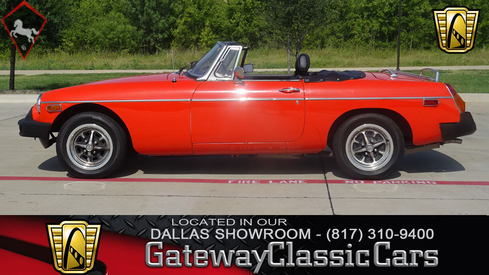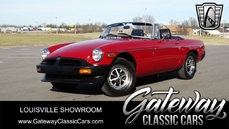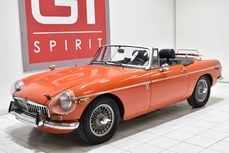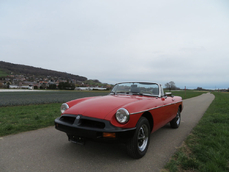MG MGB 1.8L Inline 4 1980
General description :
Gateway Classic Cars of Dallas is proud to offer this very original 1980 MG B with only 16,410 miles. The current owner was told by the previous owner that he got it up and running after it had sat for nearly 25 years on blocks in a barn. This is a very fun car to drive. Made in England, it has plenty of British character. By 1980, MG had worked out the bugs with these Bs and they really are quite reliable. This particular example in orange and oris black has been beautifully kept and drives very well. The paint has a deep shine and the interior shows very little wear. It’s clean and presentable, so it’s ready to show. This MG would be a joy to drive on a sunny day tooling around town. The recipe is simple: a 4-cylinder 1800cc engine, 4-speed manual transmission, and rear wheel drive in a small agile convertible. Simple and fun. You can see this 1980 MG B in greater detail in our Dallas showroom or at: http://www.gatewayclassiccars.com. Please contact us by7 email at dallas@gatewayclassiccars.com or by phone at 817-310-9400 with specific questions
http://www.gatewayclassiccars.com/DFW/752/1980-MG-MGB
1980 MG MGB 1.8L Inline 4 is listed sold on ClassicDigest in DFW Airport by Gateway Classic Cars for $15595.
Car Facts
Car type : Car Make : MG Model : MGB Model Version : 1.8L Inline 4 Engine size : 1.8 Model Year : 1980 Sub type : Convertible Location : Dallas
Sold
Seller Information
Sold
People who viewed this MG MGB also viewed similar MG listed at ClassicDigest
Other cars listed for sale by this dealer
About MG
The MG (Morris Garages) story is a rich tapestry that spans several decades and involves various owners and corporate entities. Here is an overview of the MG story from its inception to the challenging period under the British Leyland (BL) corporation, highlighting key models and their specifications:1. Foundation and Early Years:
Year of Establishment: 1924
Founder: Cecil Kimber
Initial Focus: Coachbuilding and customization of Morris cars.
2. MG Octagon Logo:
The iconic MG octagon logo was introduced, representing the merger of MG with Morris.
3. MG M-Type Midget (1929–1932):
Key Features:
Compact two-seater.
Powered by a 0.8L engine.
The beginning of the Midget series.
4. MG T-Series (1936–1955):
Key Models:
MG TA, TB, TC, TD, TF
Key Features:
Roadsters with classic styling.
Success in motorsports, particularly in pre and post-World War II eras.
5. Post-War Era and MG A (1955–1962):
Key Features:
Departure from traditional styling.
First MG to feature a streamlined, modern design.
Available as a roadster or coupe.
Powered by a 1.5L engine.
6. MG B (1962–1980):
Key Features:
Classic British sports car design.
Available as a roadster or GT coupe.
Produced in high numbers.
Variants included the powerful MGC.
7. MG Midget (1961–1979):
Key Features:
Compact sports car based on the Austin-Healey Sprite.
Affordable and popular.
Various iterations with engine upgrades.
8. MG C (1967–1969):
Key Features:
A more powerful version of the MGB, featuring a 2.9L inline-six engine.
Limited production.
9. BL Corporation Era (1968–1980):
Acquisition by British Leyland (BL):
MG became part of the larger British Leyland corporation.
Struggles with quality control and labor disputes.
Decline in product quality and reputation.
10. MG MGB GT V8 (1973–1976):
Key Features:
Introduction of a factory-produced MGB with a V8 engine.
Attempt to inject performance into the lineup during challenging times.
11. MG RV8 (1992–1995):
Key Features:
Limited production convertible.
Revival attempt by Rover Group (successor to BL) to rekindle the classic MG spirit.
The MG story during the British Leyland era marked a challenging period with a decline in quality and reputation. However, the brand continued to be associated with classic British sports cars.












